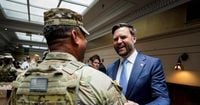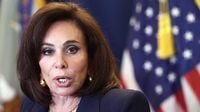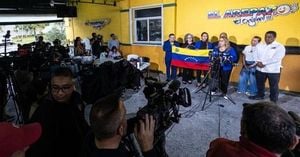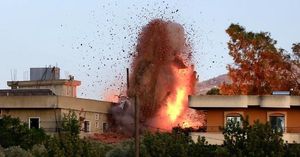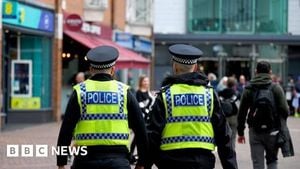In a move that’s already stirring debate across the nation’s capital, federal prosecutors in Washington, D.C., have been directed not to pursue felony charges against individuals carrying registered rifles and shotguns in the city. The policy, announced August 20, 2025, by U.S. Attorney Jeanine Pirro, marks a sharp departure from longstanding enforcement of D.C.’s strict gun statutes and comes amid an ongoing federal crackdown on crime in the district.
The shift, first reported by The Washington Post and confirmed by ABC News, directly conflicts with D.C. law, which prohibits the possession of firearms—including rifles and shotguns—without a permit. Pirro, installed in office by President Donald Trump in May, defended the policy as a necessary protection of Second Amendment rights. She cited recent Supreme Court rulings as justification, specifically District of Columbia v. Heller (2008) and N.Y. State Rifle and Pistol Association v. Bruen (2022). In the former, the Court affirmed the right to possess firearms in the home for self-defense, while the latter instructed lower courts to strike down gun regulations not grounded in historical tradition.
“Nothing in this memo from the Department of Justice and the Office of Solicitor General precludes the United States Attorney’s Office from charging a felon with the possession of a firearm, which includes a rifle, shotgun, and attendant large capacity magazine pursuant to DC Code 22-4503,” Pirro told The Washington Post. “What it does preclude is a separate charge of possession of a registered rifle or shotgun.”
According to ABC News, Pirro clarified further: “We will continue to seize all illegal and unlicensed firearms, and to vigorously prosecute all crimes connected with them. And we will continue to charge a felon in possession of any of these firearms. Our resolve to prosecute crime is not lessened by defective DC code statutes, as the DOJ works to change those statutes.” She added, “If anyone is carrying a weapon illegally, they will absolutely be charged.”
The new policy, which does not extend to handguns, means that federal prosecutors will no longer seek felony charges under the D.C. law barring the carrying of rifles or shotguns without a permit—unless the individual is a felon or the weapon is used in a violent crime. Local authorities, however, retain the power to prosecute cases involving unregistered firearms.
The timing of the announcement is no coincidence. It arrives on the heels of an aggressive anti-crime push by the Trump administration, which has flooded D.C. with federal agents and thousands of National Guard troops. The White House claims these efforts are a response to a violent crime wave, though D.C. officials point to city statistics showing a 7% year-over-year decrease in crime as of August 20, 2025. According to Reuters, the city’s crime rates have remained relatively stable, with both violent and property crime on the decline compared to the previous year.
Attorney General Pam Bondi, in a social media post, reported that the Department of Justice has made more than 550 arrests and removed 76 illegal firearms from the streets since the crackdown began. The White House has been quick to tout these numbers as evidence of the operation’s success. However, it remains unclear whether the arrest totals include those made by the Metropolitan Police Department or are limited to federal agents.
The Bureau of Alcohol, Tobacco, Firearms and Explosives (ATF) reported that in 2023, agents recovered 98 rifles and 38 shotguns in D.C. These numbers, while significant, may not fully capture the scope of gun-related crime, as not all firearms used in criminal acts are traced, and not all traced firearms were necessarily used in crimes.
The policy shift has provoked a range of reactions. Supporters, including the National Shooting Sports Foundation, argue that D.C.’s previous laws were overly restrictive, creating what they describe as a labyrinth of paperwork for residents seeking to exercise their constitutional rights. On the other hand, gun control advocates point to the district’s historically strong gun laws—which earned high marks from Everytown for Gun Safety—as vital to public safety.
Karl Racine, former D.C. attorney general, and Malvika Reddy, a former co-director of March for Our Lives’ Maryland chapter, argued in a 2021 Washington Post opinion piece that D.C.’s strict gun laws played a crucial role in limiting violence during the January 6, 2021, assault on the U.S. Capitol. “Our gun laws limited the scale of violence,” they wrote, “and will now help us hold accountable those who were caught carrying firearms to what was initially disguised as a lawful protest. These laws actively aided in the cause of protecting our democracy and our efforts to recover through accountability.”
Despite the administration’s claims of a crime emergency, city officials have pushed back, challenging the narrative of a surging crime wave and questioning the federal government’s motives. According to city statistics, the Metropolitan Police Department arrested an average of 61 adults and juveniles per day in 2024—numbers that have not markedly increased with the federal intervention.
The federal policy change comes as National Guard troops, deployed to the city after President Trump’s declaration of a crime emergency, could soon be armed while patrolling D.C. streets. National Public Radio reported that this deployment contradicts earlier Army assertions that the troops would not carry weapons or make arrests. Army Senior Master Sgt. Craig Clapper told NPR that the troops could be armed “consistent with their mission and training,” emphasizing their role in supporting civil authorities and ensuring community safety.
The presence of federal troops and agents has not gone unnoticed. On August 20, 2025, Vice President JD Vance and Secretary of Defense Pete Hegseth visited National Guard soldiers at Union Station, a gesture aimed at boosting morale but met with vocal protests from D.C. residents. According to Reuters, demonstrators jeered officials and chanted “Free D.C.!” while White House deputy chief of staff Stephen Miller dismissed them as “stupid white hippies.”
The unusual deployment of federal forces to a major American city, especially over the objections of local leaders, has raised questions about the balance of power between federal and local authorities. Unlike U.S. attorneys in all 50 states, the U.S. attorney in Washington, D.C., prosecutes both federal and local crimes, making Pirro’s policy change particularly consequential for the city’s residents.
While the Trump administration insists the crackdown is necessary to restore order and protect public safety, critics warn that relaxing enforcement of local gun laws could undermine hard-won gains in reducing gun violence. The debate is likely to continue as the city, and the nation, grapple with the complex intersection of constitutional rights, public safety, and federal authority.
For now, the capital finds itself at the center of a high-stakes experiment in gun policy and law enforcement—a test that may set precedents far beyond the city’s borders.
